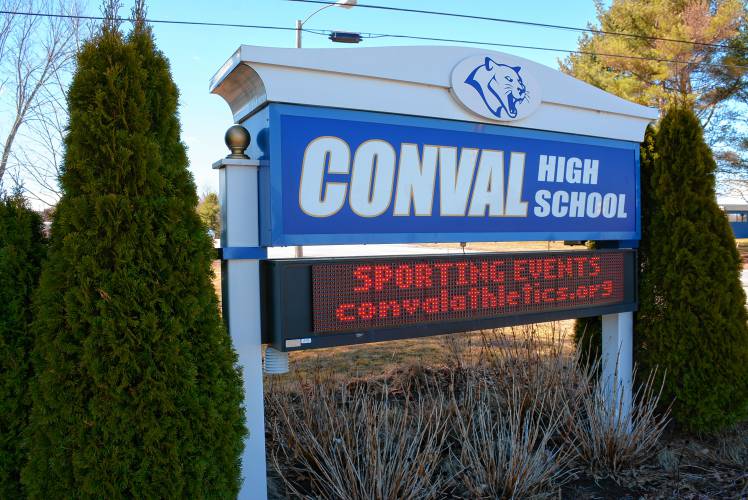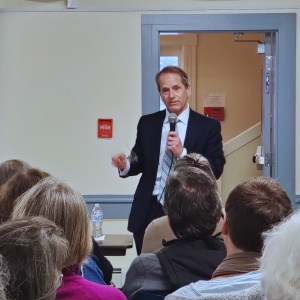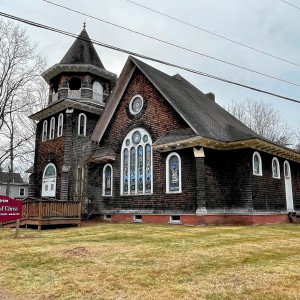State to appeal decision in ConVal school-funding case

ConVal High School. FILE PHOTO
| Published: 12-15-2023 5:21 PM |
As expected, the state has signaled its intention to appeal Judge David Ruoff’s order finding the system of funding public schools unconstitutional to the New Hampshire Supreme Court.
In November, Ruoff found state funding for an adequate education of $4,100 per pupil “constitutionally insufficient” and required the Legislature to set the base cost of an adequate education at a minimum of $7,356.01.
The state asked the court to stay the order until the Supreme Court has considered its appeal and rendered final judgment, and after that until one session of the Legislature has passed.
In its motion to stay Judge Ruoff’s order, the state argues that if the order were to take effect immediately, the state would be unable to distribute state aid in the form of adequacy grants to school districts until the Legislature remedied the flaws in the existing system of funding education.
At the same time, the state argues that the court’s order violates the principle of separation of powers enshrined in the state constitution and past precedent. The state cites precedent to hold that “the Legislature and judiciary are coordinating departments of the state government; and it is the policy of the law that each, when acting within the scope of its authority, shall be supreme in the exercise of the powers committed to it, and that neither shall be subject to the control or supervision of the other.” And the motion adds that the Supreme Court ruled that New Hampshire follows “the rule that exempts the Legislature from the control of the court.”
In support of its position, the state refers to an opinion of the New Hampshire Supreme Court, which it paraphrases to conclude that “the Supreme Court has uniformly deferred to the General Court to fix an unconstitutionality unfettered by a court-imposed injunction forcing it to act in one or more ways.”
However, in that same opinion, the justices also wrote, “Respectful of the roles of the legislative and executive branches, each time this court has been requested to define the substantive content of a constitutionally adequate public education, we have properly demurred. Deference, however, has its limits. For almost thirteen years, we have refrained from doing so and continue to refrain today. However, the judiciary has a responsibility to ensure that constitutional rights not be hollowed out and, in the absence of action by other branches, a judicial remedy is not only appropriate but essential.”
These articles are being shared by partners in The Granite State News Collaborative. For more information visit collaborativenh.org.
Article continues after...
Yesterday's Most Read Articles
 Frank Edelblut speaks at Dublin Education Advisory Committee forum
Frank Edelblut speaks at Dublin Education Advisory Committee forum
 Francestown Academy Coffeehouse is in its second year
Francestown Academy Coffeehouse is in its second year
 Petitioners seek special Town Meeting regarding tax lien on Antrim Church of Christ
Petitioners seek special Town Meeting regarding tax lien on Antrim Church of Christ
 UPDATE: Drivers identified in Jaffrey dump truck crash
UPDATE: Drivers identified in Jaffrey dump truck crash
 Alan Edelkind defends actions on proposed ConVal reconfiguration
Alan Edelkind defends actions on proposed ConVal reconfiguration
 Jaffrey Civic Center hosting ‘Two Tours’ exhibit
Jaffrey Civic Center hosting ‘Two Tours’ exhibit

 Gail Hoar: Words About Wilton – Lessons while walking
Gail Hoar: Words About Wilton – Lessons while walking New photography studio opens on Jaffrey Main Street
New photography studio opens on Jaffrey Main Street State of the Schools – Budget challenges, but lots to celebrate at Mascenic
State of the Schools – Budget challenges, but lots to celebrate at Mascenic Jarvis Coffin: Off the Highway – Liver free or die
Jarvis Coffin: Off the Highway – Liver free or die
